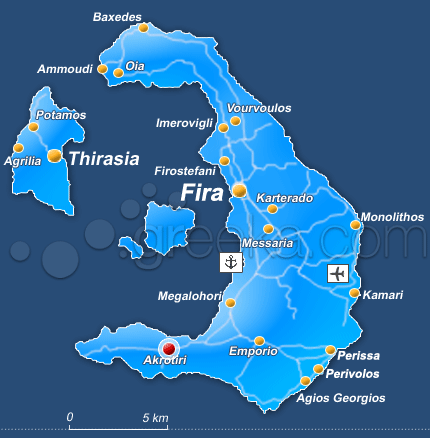Countries that are not really countries, yet play a significant role in the affairs of countries. Countries that are not really countries, but a piece cut out of a country, belonging to a foreign country, impacting directly upon the politics and culture of the host. We will encounter many of both of these as we journey through the atlas of the world; and some will meet both of the terms defined above. Akrotiri, of which I am prepared to bet that you have never heard until this moment, Akrotiri falls into the second category.
You will find it, though you may well have visited the island and never known that it was there to miss, on the Mediterranean island of Cyprus. By the terms of the 1960 Treaty of Establishment which created the independent Republic of Cyprus, the United Kingdom retained full sovereignty and jurisdiction over two areas of almost 254 square kilometers - the one at Akrotiri and the other at Dhekelia. The southernmost and smallest of these is the Akrotiri Sovereign Base Area, which is also referred to as the Western Sovereign Base Area.
 Despite the presence of the military base, the surrounding area is not restricted, nor part of the United Kingdom, and tourists do indeed go to look at the archaeological excavations being undertaken there, as well as those further along the glorious Red Beach at Santorini (the church of Agios Nikolaos is particularly impressive, as are the lighthouse and the Venetian castle. Trip Advisor has some useful reviews and guidance). What was once a Minoan settlement was destroyed by a volcanic eruption in the early 1600s, but this is no Pompeii; most of what there is to see is in the National Archaeological Museum in Athens.
Despite the presence of the military base, the surrounding area is not restricted, nor part of the United Kingdom, and tourists do indeed go to look at the archaeological excavations being undertaken there, as well as those further along the glorious Red Beach at Santorini (the church of Agios Nikolaos is particularly impressive, as are the lighthouse and the Venetian castle. Trip Advisor has some useful reviews and guidance). What was once a Minoan settlement was destroyed by a volcanic eruption in the early 1600s, but this is no Pompeii; most of what there is to see is in the National Archaeological Museum in Athens. None of this explains why the British have the need, let alone the right, to own a piece of Cyprus, nor what help this presence provides in resolving the schism between Greek and Turkish Cypriots (absolutely none, as far as anyone can tell), but including it here at least allows to give the place some marks in favour.
Marks For: 3
Marks Against: 7
See also Dhekelia.
You can find David Prashker at:
http://theargamanpress.com/
http://davidprashker.com/
http://davidprashker.net/
https://www.facebook.com/TheArgamanPress
http://davidprashkersprivatecollection.blogspot.com
http://davidprashkerssongsandpoems.blogspot.com
http://davidprashkersbookofdays.blogspot.com/
http://davidprashkersartgallery.blogspot.com/
http://theargamanpress.com/
http://davidprashker.com/
http://davidprashker.net/
https://www.facebook.com/TheArgamanPress
http://davidprashkersprivatecollection.blogspot.com
http://davidprashkerssongsandpoems.blogspot.com
http://davidprashkersbookofdays.blogspot.com/
http://davidprashkersartgallery.blogspot.com/
Copyright © 2015 David Prashker
All rights reserved
The Argaman Press
No comments:
Post a Comment